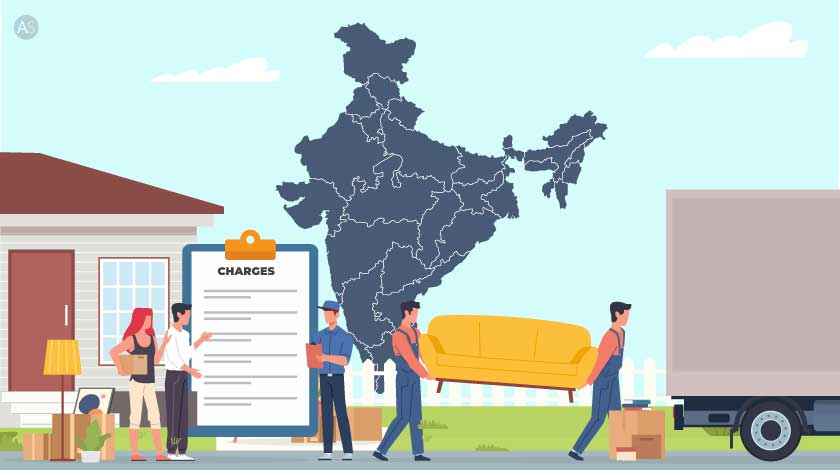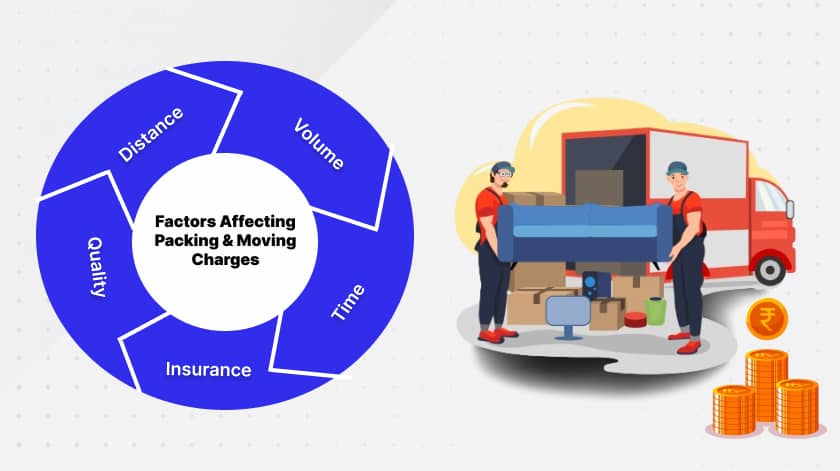Local to Global: Understanding Packers and Movers Charges in India

One of the most crucial aspects of the moving process is understanding the packers and movers charges. This blog aims to provide a comprehensive guide to the various charges associated with household shifting, ensuring that you are well-prepared for your move.
By the end of this blog, you will have a clear understanding of the various charges involved in household shifting, the factors that influence these costs, and practical tips to manage your moving expenses efficiently.
Packers and Movers Cost for Local House Shifting
Although local shifting is easier than domestic shifting, the costs can still vary significantly based on several factors. Here, we will provide an overview of the approximate charges for local house shifting within different city sizes in India.
Approximate Charges for Local House Shifting
| City Size | 1 BHK (₹) | 2 BHK (₹) | 3 BHK (₹) |
|---|---|---|---|
| Small City (Tier 3 cities) | 2,500 - 5,000 | 4,000 - 8,000 | 6,000 - 12,000 |
| Medium City (Tier 2 cities) | 3,000 - 6,000 | 5,000 - 10,000 | 7,000 - 15,000 |
| Large City (Tier 1 cities) | 3,500 - 8,000 | 6,000 - 12,000 | 9,000 - 20,000 |
Note: The costs of local shifting can vary based on the size of the city and the specific requirements of the move. The above table illustrates the approximate charges for household shifting within small, medium, and large cities in India.
Packers and Movers Rate per km for Local Shifting
For local shifting, the packers and movers rate per km typically ranges from ₹12 to ₹25, depending on the city and the specific service provider. This rate can be influenced by factors such as traffic conditions, fuel costs, and the overall distance covered within the city.
Example: The packers and movers charges for a 1 BHK local shifting in a metro city might range from ₹3,000 to ₹8,000, considering factors like the volume of goods, the distance to be covered, and the specific requirements of the move.
Packers and Movers Charge for Domestic Shifting
Unlike local shifting, which is confined to shorter distances within a single city, domestic shifting covers longer distances and often includes crossing state borders. This type of move requires thorough planning and accurate cost estimation to ensure a smooth and hassle-free relocation.
Approximate Charges for Domestic Shifting
| Distance Range | 1 BHK (₹) | 2 BHK (₹) | 3 BHK (₹) |
|---|---|---|---|
| 100-500 km | 8,000 - 15,000 | 12,000 - 22,000 | 15,000 - 30,000 |
| 500-1000 km | 10,000 - 20,000 | 15,000 - 28,000 | 20,000 - 40,000 |
| 1000+ km | 15,000 - 25,000 | 20,000 - 35,000 | 25,000 - 50,000 |
Note: The cost of domestic shifting in India varies based on the distance between the origin and destination cities. The above table shows the approximate charges for household shifting over various distances.
Packers and Movers Rate per km for Domestic Shifting
The packers and movers rate per km for domestic shifting typically ranges from ₹20 to ₹40, depending on factors such as the volume of goods, the type of transport vehicle used, and the specific service provider.
Example: For a 2 BHK house shifting from Delhi to Mumbai, the movers and packers price can range from ₹15,000 to ₹30,000. This estimate includes factors such as distance, volume of goods, packing materials, and additional services required for a smooth relocation.
Packers and Movers Charge for International Moving
International shifting is significantly more complex than local or domestic shifting due to the longer distances, different regulations, and additional logistical challenges. Understanding the costs and factors involved in international shifting is crucial for a smooth and successful relocation.
Approximate Moving Charges for Popular International Destinations
| Destination Country | 1 BHK (₹) | 2 BHK (₹) | 3 BHK (₹) |
|---|---|---|---|
| USA | 1,50,000 - 2,50,000 | 2,00,000 - 3,50,000 | 3,00,000 - 5,00,000 |
| UK | 1,20,000 - 2,00,000 | 1,80,000 - 3,00,000 | 2,50,000 - 4,50,000 |
| Australia | 1,00,000 - 1,80,000 | 1,50,000 - 2,50,000 | 2,00,000 - 3,50,000 |
| UAE | 80,000 - 1,50,000 | 1,20,000 - 2,00,000 | 1,80,000 - 3,00,000 |
| Canada | 1,50,000 - 2,50,000 | 2,00,000 - 3,50,000 | 3,00,000 - 5,00,000 |
Note: The cost of international moving can vary widely based on the destination country, the volume of goods, and the specific services required. Above are some approximate charges for moving from India to popular international destinations.
Example: Moving a 3 BHK household from India to the USA can cost between ₹3,00,000 and ₹5,00,000. This estimate includes factors such as the shipping method (usually sea freight for larger volumes), customs duties, insurance, and compliance with destination country regulations.
Factors Affecting Packing and Moving Charges

Understanding the various factors that influence packers and movers charges is crucial for effective budgeting and preparation. Here are the key factors that can affect the cost of packing and moving services in India:
Distance: Impact on Fuel and Time
The distance between the origin and destination is one of the most significant factors affecting moving costs. Longer distances mean higher fuel consumption and more time spent on the road, both of which contribute to increased charges. Whether you're moving locally within a city or to another city or country, the distance directly impacts the overall cost.
Example: Moving within a city might cost less due to shorter distances, while moving from one city to another could incur higher costs due to increased fuel and time requirements.
Volume and Weight of Belongings
The total volume and weight of your belongings play a crucial role in determining the cost of your move. More items or heavier goods require more packing materials, larger or more transport vehicles, and additional labor for loading and unloading, all of which add to the overall cost.
Example: The cost of packers and movers can vary significantly based on the volume of goods and distance to be covered.
Time of the Move
The timing of your move can significantly affect the cost. Peak seasons, such as summer months and holiday periods, see higher demand for moving services, leading to increased charges. On the other hand, moving during non-peak seasons can result in lower costs due to reduced demand.
Example: Planning your move during the off-season can help you save on packers and movers charges.
Insurance Coverage
Insurance protects your belongings against potential damage or loss during transit. The cost of insurance adds to the overall moving charges but provides peace of mind.
Example: Opting for insurance coverage can increase the overall cost but ensure that your valuable items are protected during the move.
Quality and Reputation of the Service Provider
Established companies with a proven track record and positive customer reviews may charge higher rates due to their reliable services and professional approach.
Example: Choosing a reputable moving company can ensure a smoother move but might come at a higher price compared to less established providers.
Tips to Reduce Packers and Movers Charges

Moving can be expensive, but with careful planning and smart strategies, you can significantly reduce your packers and movers charges. Here are some practical tips to help you save money on your move:
Declutter: Dispose of or Donate Unnecessary Items
Take the time to sort through your belongings and get rid of items you no longer need. Consider donating usable items to charity or disposing of things that are no longer in good condition. By reducing the volume of goods to be moved, you can lower the overall cost.
Example: Fewer items mean less packing material, fewer boxes, and potentially a smaller moving vehicle, all of which contribute to lower costs.
Plan Ahead: Book in Advance to Avoid Last-Minute Price Hike
Movers often charge higher rates for urgent or last-minute bookings due to the added pressure and scheduling conflicts. By planning your move early, you can secure better rates and have more time to compare different service providers.
Example: Booking your move at least a month in advance can give you access to more affordable rates and better service options.
Compare Quotes: Get Estimates from Multiple Service Providers
Get estimates from multiple packers and movers to compare prices and services. This allows you to identify the best deal and negotiate better terms. Make sure to provide the same details to each provider for accurate comparisons.
Example: Comparing quotes from at least three different moving companies can help you find the best value for your money.
Flexible Moving Dates: Opt for Non-Peak Times if Possible
Moving during peak seasons, such as summer months or holidays, can be more expensive due to high demand. If possible, choose flexible moving dates during non-peak times to take advantage of lower rates.
Example: Moving on a weekday or during the off-season can help you save on packers and movers charges.
DIY Packing: Handle Some of the Packing Yourself to Save Costs
To save money, consider handling some of the packing yourself. Start by packing non-fragile items like books, clothes, and kitchen utensils. Leave the packing of delicate and valuable items to the professionals to ensure their safety.
Example: By packing your belongings yourself, you can reduce labor costs and the amount of packing materials needed from the moving company.
Negotiate: Don’t Hesitate to Negotiate the Final Quote
Once you have received quotes from different movers, don’t hesitate to negotiate the final price. Many moving companies are open to negotiation, especially if they know you are considering other offers.
Example: Negotiating the final quote can lead to discounts or added services at no extra cost, ultimately reducing your overall moving expenses.
Wrapping Up: Key Insights for Managing Packers and Movers Charges
Understanding the packers and movers charges is crucial for anyone planning to relocate, whether locally, domestically, or internationally. Knowing the costs involved helps you budget effectively, avoid unexpected expenses, and make informed decisions throughout the moving process.
In this blog, we have covered several important aspects of moving charges, like - Packers and Movers Cost for Local House Shifting, Packers and Movers Charge for Domestic Shifting; Packers and Movers Charge for International Moving from India; Factors Affecting Packing and Moving Charge; and Tips to Reduce Packers and Movers Charges. By using the information provided in this blog, you can make more informed decisions and choose the right service provider for your move.
We hope this guide has been helpful in providing a comprehensive overview of the packers and movers charges and the factors that influence them. Armed with this knowledge, you can confidently navigate the moving process and ensure a smooth and successful relocation.











